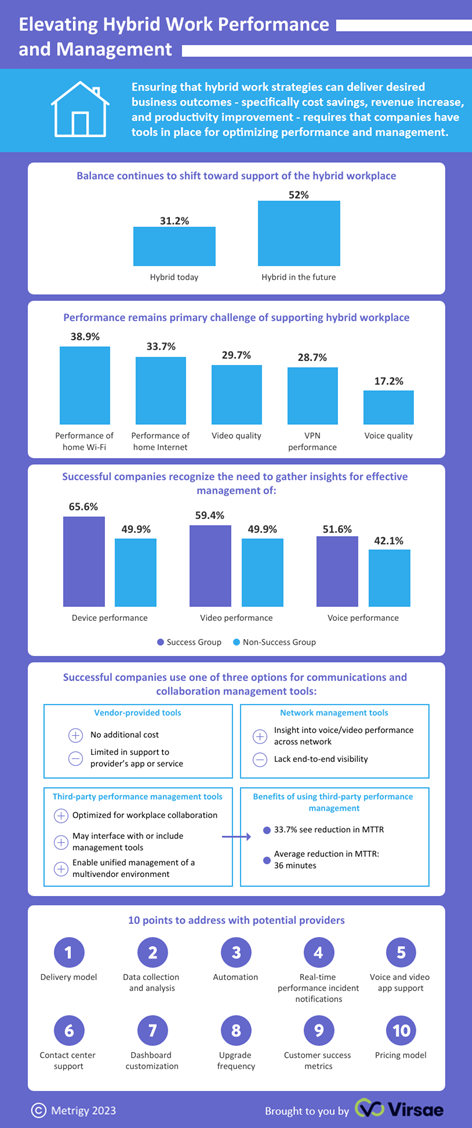Highlights video by Beth Shultz, VP of Research & Principal Analyst Metrigy.
Third party performance management tools provide a critical view of what's happening across the hybrid workplace.
For most companies today, hybrid work has become the norm. On any given day, some employees will be working from home (WFH), and others from the office–and no matter where they are, they need to be able to communicate and collaborate with ease. However, challenges persist around issues such as application performance, bandwidth constraints, voice and video quality, and technology inequity between in-office and remote workers.
Metrigy's Workplace Collaboration: 2023-24 research study revealed challenges continue to plague hybrid work for many on both ends of the workplace, and companies should recognize the need to adjust strategies as they seek resolutions. To support the hybrid workplace, IT and business leaders must have insight into the user experience and have tools in place for optimizing performance and management.
Gaining insight into what's going on for employees is key. For remote workers, Metrigy’s research shows home Wi-Fi performance is a primary challenge for 39% of companies. Followed closely by home Internet and VPN performance, video and voice quality, for between 17% and 34% of companies.
Metrigy recommend looking at four areas for optimization of hybrid work:
- Endpoints - Device management; inventory, security and performance
- Security - Enterprise-wide security and compliance controls, and use of third party tools supporting multi-platform environments
- Administration - Configuration, event, address management, plus self-service capabilities
- Performance - Monitoring app uptime, network, problem/resolution, root cause analysis, and ongoing performance of collaboration apps
Only once tools are in place for optimizing performance and management will companies be able to ensure their hybrid work strategies can deliver desired business outcomes such as cost savings, revenue increase, and improved productivity.
Indeed, Metrigy found that success correlates with the use of device, video, and voice performance management. Successful companies being those that gather insights of devices 66%, of video 59% and of voice 52%.
Likewise, success correlates to the use of communications and collaboration management tools. When it comes to determining which type of tools to consider, Metrigy recommends taking a close look at third party performance management tools, such as provided by Virsae. Notably, companies using these tools reported a one third reduction in MTTR (mean time to repair), which translates into lower cost of IT operations as well as lower cost of business disruption from an outage.
Virsae’s Service Management platform (VSM) delivers the multi-vendor communications performance management necessary for hybrid environments, with end-to-end visibility across technical, network, WFH device and room analytics. Combining big data, machine learning, AI-powered diagnostics, and automation, VSM empowers companies with the insight to optimize customer and employee experience, resolve technology issues faster, manage costs, and reinforce security and compliance.
With the proper policies and technologies in place, hybrid work can lead to desired business outcomes of reduced costs, revenue increases, and productivity gains, while also improving employee satisfaction and reducing turnover.
Read the Metrigy Hybrid Work Success Whitepaper for full insight.
Download and share the Infographic.
A few guidelines to boost hybrid work success:
- Provide correlation between hybrid work policies and technologies with KPIs such as employee satisfaction and turnover
- Invest in tools that provide real-time and predictive visibility into communications and collaboration performance, for all deployed apps
- Address Wi-Fi, Internet, and VPN performance of WFH environments that hinders remote workers to communicate and collaborate effectively
- Adjust in-office Wi-Fi capacity, Internet bandwidth, and network architecture to support increasing real-time communications traffic
- Gather insight into the user experience via tools for optimizing performance and management

